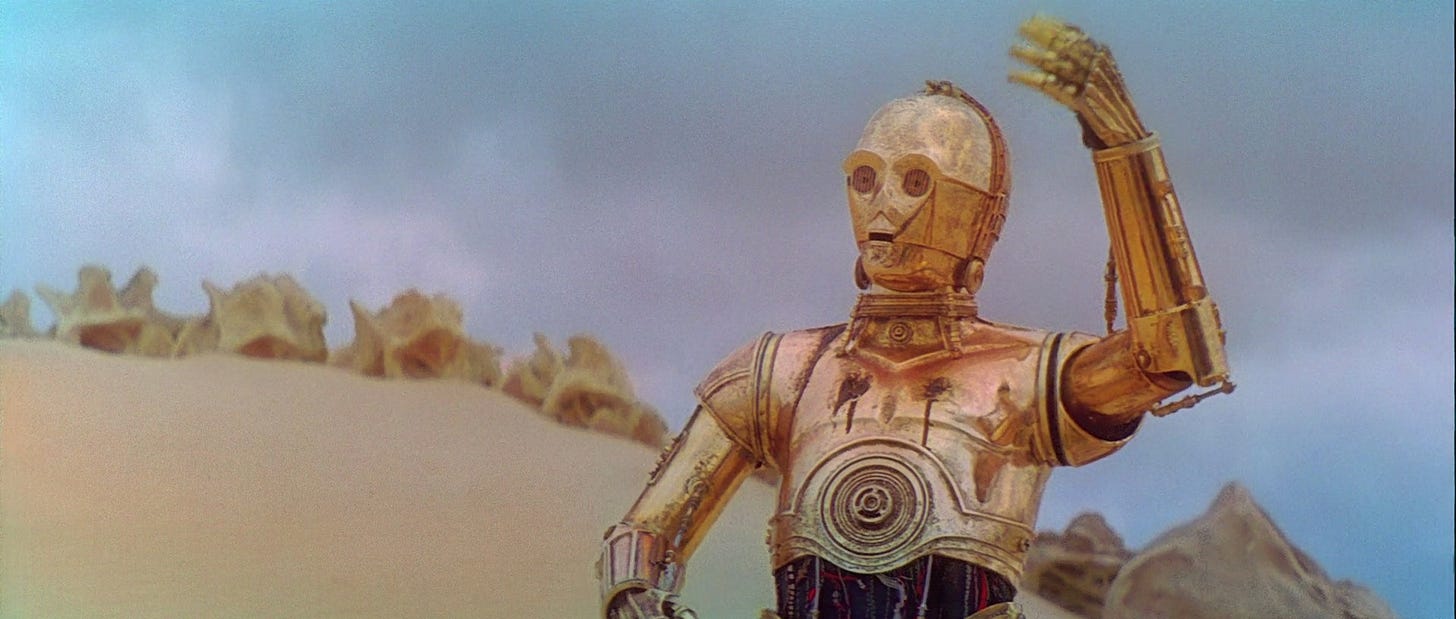Forty Two Years Since Star Wars
The big one.
It’s another Star Wars revisit from me. After previously covering The Phantom Menace, Attack of the Clones, Revenge of the Sith, Solo and Rogue One, we now get to the biggie, the main event, the one that got the whole franchise going.
(A quick note about terminology. The film itself, as it was known in 1977, is called Star Wars. The subtitle A New Hope was later added, but I will largely refer to the film by its original title).

How do you write about Star Wars?
It’s become such a touchstone, such a building block in our culture, that going back to the original text feels impossible. To watch Star Wars today as a lifelong viewer is to breathe air. It’s a film you’ve seen a million times, exactly as you remember it (give or take a few George Lucas alterations along the way). As film critic Keith Phipps put it in 2014, “it's pre-critical for me. It's like asking my opinion on Coca-Cola”.
It’s infected everything since. Ending the New Hollywood era and turning the film industry towards big scale blockbuster fare in a stroke, it’s a film that everyone is trying to evoke. Within the Star Wars franchise, every new entry is in some way trying to recapture a part of the original. The Force Awakens may as well have been J.J. Abrams’ cover version of it. In The Mandalorian, the new Star Wars TV series at the heart of Disney’s entire push into the streaming space, creator Jon Favreau wants to “evoke the aesthetics of not just the original trilogy but the first film. Not just the first film but the first act of the first film”. And one could argue this level of devotion is what every blockbuster in Hollywood has been doing for the last four decades.
I mean, jesus, it’s just Star Wars. It’s just a film.
Prolific TV writer-producer Javier Grillo-Marxuach wrote, in a searingly essential essay, that “all maturing artists engage in a dialogue with what came before... but I can't think of a single instance in history when so many of us are so actively engaged in paying homage to a single work of art. Bluntly: we are all cribbing our best moves from the same two-hour movie and it has to stop”.
That’s the context we bring with us when we watch Star Wars. But let’s try to strip all that away. What do you see when you watch Star Wars the film, and not Star Wars the franchise kingpin? It’s very difficult to do.
The thing about Star Wars that stands out, at least compared to other entries in the franchise, is how rough it is around the edges. There are a lot of shots that are kind of rusty. This was a famously difficult shoot, especially in the sections shot in Tunisia, but even elsewhere it’s clear that everything had to be done in minimal takes. In a shot like this, you can see that the wind combined with the sand was causing them some issues and I doubt this is the visual Lucas had in his head.

The dialogue is, as you may have heard, on the clunky side. “I have a bad feeling about this” wasn’t even a meme in this film, it was just a lazy line. The seed of every criticism laid at Lucas’ feet over the years is in here. He even can’t resist giving scenes over to fancy visual effects. Empire Strikes Back and Return of the Jedi were able to clean these flaws up with bigger budgets better people around Lucas, but this film is his, and oh boy is it his.
None of this matters one bit, obviously, and nor should it. Generational blockbuster movies that everyone sees aren’t about perfection. The only thing that matters is that they resonate. Gone with the Wind has all sorts of problems but it makes people feel things where it matters. Titanic is the same. Star Wars is a big touchstone film and it has these qualities as much as anything ever made. To quote a line from the most quoted film of all time, “she’s got it where it counts”. When it needs to deliver, it has a jaw dropping visual paired to a John Williams score containing four or five pieces of music that would be almost anyone else’s career highlight. The characters are archetypes, but they work. The film has you in its spell.
And that’s what makes it so strange that we’ve spent so much time making analogue copies of this thing. The world has been so obsessed with recapturing the magic alchemy this film has that they’ve missed the forest for the trees. There are details in this film that were just offhand shrugs from Lucas that have been relentlessly copied ever since, as though they contain some mystical key to making a great blockbuster. It’s the moments that resonate, stupid. Lucas knows this is a film with problems, and that’s why he’s tinkered with it so much (to no real benefit, but that’s a story for another day). To bring this back to what Grillo-Marxuach said, “Star Wars may have taught the Hero's Journey to entire generations, but it is our responsibility to use the paradigm and to forge something with its own emotional integrity”.
Star Wars has been so fetishised as to have lost its meaning. The wider franchise is being held back by a desperate desire to continually remake this two hour film from 1977. It’s a wonderful movie, a true classic. But in order to honour it properly, it might be time to move on.

